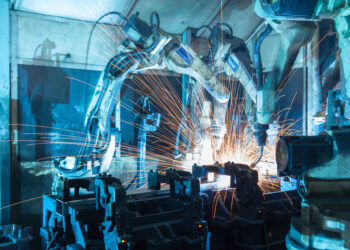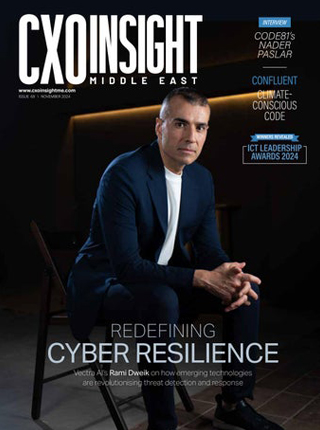
It’s hard to believe that we’ve started the year 2020 and that a very interesting decade has come to an end. With every end comes a new beginning and we view 2020 as the start of a more intelligent and connected world enabled by technology.
In the interest of learning from looking back, I revisited our 2019 predictions, some of which I am happy to report have come to fruition faster than others.
The implementation of 5G across the region is one such example. Many telecommunication providers in the region are already offering 5G connectivity to their customers, transforming experiences significantly. And who knows, we could also start hearing about 6G networks!
On the back of this, cities in the region are becoming more connected than ever, paving the way for Smart Cities and digital infrastructure that we predict will be thriving come 2030. And it will be a game-changer for industries such as healthcare and manufacturing, where data and information generated from the field can be quickly processed and analysed in real-time, and then readily shared with those who need it.
All of this requires skilled talent and as we predicted, 2019 has seen a new generation of digital natives enter the workplace and organisations have begun to step up to modernise infrastructure, inspire employees and integrate the relevant applications will have an advantage over those that struggle with legacy systems, data deluge and workforces that are resistant to change.
Another prediction was about the data gold mine and the ‘Gold Rush’ in tech investment, with data valued as a primary resource. In 2019, we saw the importance placed on data, leading to regulations are now being set to protect this valuable resource. Organisations are now addressing challenges of data management and analytics and leveraging their data to bring AI and machine-learning to life.
The region as we know it, is poised for the fourth industrial revolution. In fact, if you consider the UAE Vision 2021, Saudi Vision 2030 and Kuwait Vision 2035, the common theme is around developing digital economies of the future.
At the root of all this innovation and advancement are – you guessed it – massive amounts of data and compute power, and the capacity across edge, cloud and core data center infrastructure to put data through its paces. With the amount of data coming our way in the next 10 years – we can only imagine what the world around us will look like in 2030, with apps and services helping us do and know things we haven’t even thought of yet!
2020 marks the beginning of what we at Dell Technologies are calling the Next Data Decade, and we are no doubt entering this era with new – and rather high – expectations of what technology can make possible for how we live, work, and play.
So, what new breakthroughs and technology trends will set the tone for what’s to come? Here are our top predictions for the year ahead.
2020 will be the year to simplify IT
This year we will see organisations accelerate their digital transformation by simplifying and automating their IT infrastructure and consolidating systems and services into holistic solutions that enable more control and fuel data automation. All of this enables better, faster business outcomes that the innovation of the next decade will thrive on.
Accelerated multi-cloud journeys to store and protect data
As 5G and edge deployments continue to rollout, organisations will expect more of their cloud and service providers, to ensure they have better data management and visibility, while also ensuring that their data remains accessible and secure. IDC has predicted that by 2021, over 90% of enterprises worldwide will rely on a mix of on-premises/dedicated private clouds, several public clouds, and legacy platforms to meet their infrastructure needs.
Choose how you pay
In 2020, flexible consumption model and as-a-service options will accelerate rapidly as organisations seize the opportunity to transform. As a result, they’ll be able to choose the right economic model for their business to take advantage of end-to-end IT solutions that enable data mobility and visibility and crunch even the most intensive AI and Machine Learning workloads when needed.
‘The Edge’ rapidly expands to the enterprise
2019 has showed us that the edge is everywhere around us and is only going to expand with enterprise organisations leading the way, delivering the IT infrastructure to support it. So, we will see new advancements in software-defined networking. Open networking solutions will also prevail over proprietary, as organisations recognise that the only way to successfully manage and secure data for the long haul is with the flexibility and agility that only open software defined networking can deliver.
Intelligent devices change the way we work and collaborate
A recent study by Gartner revealed that spending on disruptive technologies will increase. Artificial intelligence (AI) was seen as the primary game-changing technology in 2019 by 38 percent of GCC CIOs. Data analytics is second, identified by 22 percent of respondents.
Software applications that use AI and machine learning create systems that now know where and when to optimise power and compute based on your usage patterns. Over the next year, these advancements, will turn our PCs into even smarter companions. They’ll have the ability to optimise power and battery life for our most productive moments – and even become self-sufficient machines that can self-heal and self-advocate for repair – reducing the burden on the user and of course, reducing the number of IT incidents filed.
Innovating with integrity, sourcing sustainably
In 2018, members of the UAE’s Federal National Council passed a draft federal law on integrated waste management. The law puts forward a variety of strategies that aim to achieve a national recycling rate of 75% of solid waste. Such laws prove that sustainable innovation will continue to take centre stage, and Dell Technologies wants to ensure the impact we have in the world doesn’t come with a dangerous impact on the planet. Greater investments in reuse and recycling for closed-loop innovation will accelerate – hardware becoming smaller and more efficient and built with recycled and reclaimed goods.
As we enter 2020, I’m optimistic and excited about what the future holds. The steps our customers will take in the next year to get the most out of their data will enable new breakthroughs in technology that everyone will experience in some way – whether it’s a more powerful device, faster medical treatment, more accessible education, less waste and cleaner air.
And before we know it, we’ll be looking forward to what the following decade will have in store.










Discussion about this post